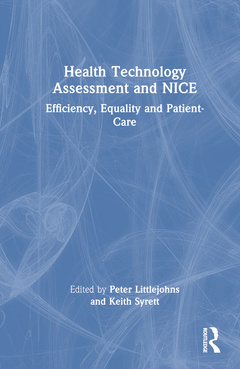Description
NICE at 25
A quarter-century of evidence, values, and innovation in health
Language: English
Subjects for NICE at 25:
Keywords
· 15.2x22.9 cm · Hardback
Description
/li>Contents
/li>Readership
/li>Biography
/li>
Marking its 25th anniversary, this fascinating collection examines the pioneering work of the National Institute for Health and Care Excellence (NICE).
Setting standards for the delivery of healthcare, issuing guidance on public health, and assessing and making recommendations on health technologies, NICE has attracted widespread international attention, emulation, and comment. The authors in this collection, drawn from a broad range of disciplinary backgrounds, offer analysis of key issues which have informed NICE?s work, from the principles of health economics, to patient engagement, to the legal basis on which NICE operates.
Covering many of the most important themes within contemporary debates on health policy and management today, this insightful collection will interest students and researchers, as well as policy makers in the field.
Foreword
Preface
Acknowledgements
1 Introduction – why NICE and why the book?
2NICE and resource allocation in the NHS: paradise lost?
3 Understanding the survival of NICE through a political science lens
4 NICE’s paradigm of public practical reasoning
5 Innovation, values and NICE’s changing societal role
6 Do NICE’s HTA processes still lead to net improvements in NHS services?
7 Public Health at NICE: methods, politics and policy
8 Public involvement at NICE: Evolution, not revolution
9 NICE and the law: judicial oversight, juridification and legitimacy?
10 Enhancing the value of public spending on technology around the world
11 Conclusion – NICE from the past into the future
Peter Littlejohns is Emeritus Professor of Public Health at King’s College London, and the founding Clinical and Public Health Director of NICE. He has led on a number of international research programmes addressing ways of improving the effectiveness and efficiency of health services through fair prioritisation policies.
Keith Syrett is Professor of Health Law and Policy and Director of the Centre for Health, Law, and Society in the School of Law, University of Bristol, UK. He has written extensively on the legal regulation of resource allocation in healthcare, health technology assessment, and public health law.
These books may interest you

Ophthalmic Nursing 71.13 €



